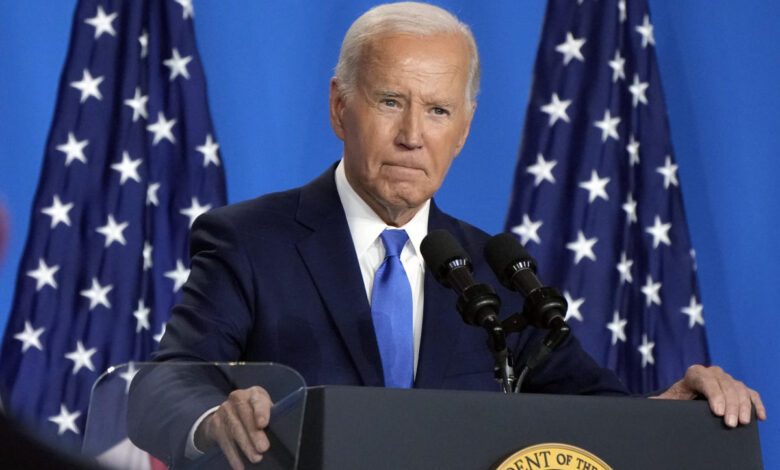
On Sunday, President Biden announced he will not seek reelection in November, adding to uncertainty about who will be in the White House in 2025.
Stocks appeared to shrug off worries related to the election, with the S&P 500 rising over 1% on Monday. Investors also gained clarity over the state of the Democratic ticket, as Biden was joined by several prominent Democrats, most notably Speaker Emerita Nancy Pelosi, in endorsing Vice President Kamala Harris as the nominee.
In a note to clients on Monday, RBC Capital Markets head of global equity strategy research Lori Calvasina wrote the news added “yet another curveball” for investors trying to digest how political news will impact the stock market in 2024.
A key driver for stocks lately has been investor confidence in who the next president will be. As odds rose in betting markets that former President Donald Trump would win November’s election, stocks also rose. When Trump’s odds peaked around July 16, the S&P 500 hit its most recent high.
“If the change at the top of the ticket swings momentum in the race for the White House back to the Democrats, the historical relationship suggests that it could be fuel for a short-term pullback that may already be underway,” Calvasina wrote.
“If Trump expands his lead, the historical data suggests that stocks may avoid the pullback we’ve been worried about. But it’s possible this relationship won’t hold up.”
Roundhill Investments CEO Dave Mazza echoed a similar sentiment in an interview with Yahoo Finance on Monday, noting that if a new Democratic nominee pushes markets to expect a closer presidential race, investors should expect “more volatility.”
Mazza added that the upcoming week in markets could be “messy” overall, with the start of Big Tech earnings as well as readings on economic growth and inflation all coming alongside the ongoing political upheaval.
“The biggest headlines for the near term are going to be what happens with the presidential election,” Mazza said. “And then investors will try to absorb the corporate earnings and then start looking at the Fed again.
“I do think it’s going to be a bit choppy,” Mazza said, “but…where earnings come in, ultimately, will be that longer-term driver, even if there’s a lot of macro headlines in the near term.”
As for how investors should start thinking about the possibility of a Trump-Harris face-off, the initial reaction from Wall Street showed investors should remain in wait-and-see mode.
“We don’t think there’s a lot of mileage to be had in trawling through [Harris’s] policy positions during the 2020 primary, particularly as she focused more on social issues rather than economic initiatives,” wrote Paul Ashworth, chief North America economist at Capital Economics.
Josh Schafer is a reporter for Yahoo Finance. Follow him on X @_joshschafer.
Click here for in-depth analysis of the latest stock market news and events moving stock prices
Read the latest financial and business news from Yahoo Finance

